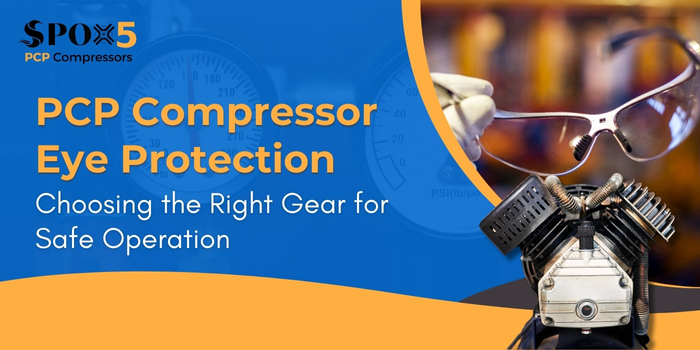PCP (progressing cavity) compressors are powerful tools, but with great power comes great responsibility, especially regarding safety. While the focus often falls on pressure hazards, protecting your eyes is equally crucial. A single burst of compressed air or debris from a malfunctioning compressor can cause permanent vision damage. This blog explores the importance of eye protection for PCP compressor users and guides you in selecting the right gear for optimal safety.
Why Eye Protection Matters:
The potential for eye injuries during PCP compressor operation is a real concern. Here’s why:
- High-Pressure Air: PCP compressors generate high-pressure air, which can forcefully propel debris or even small parts during operation or malfunction.
- Potential for Leaks and Rupture: Despite safety measures, leaks can occur in hoses or connections. In the worst-case scenario, a pressure vessel rupture can send shrapnel flying.
- Cleaning and Maintenance: During cleaning and maintenance procedures, chemicals or debris can come loose and strike your eyes.
The Right Gear for the Job:
Not all eye protection is created equal. Here’s what you need to consider when choosing the right gear for PCP compressor use:
- Impact Resistance: Look for safety glasses with impact-resistant polycarbonate lenses. These lenses are designed to withstand the force of high-velocity projectiles, protecting your eyes from debris or shrapnel.
- ANSI Z87.1 Rating: Ensure your safety glasses carry the ANSI Z87.1 rating. This standard signifies that the glasses have passed rigorous testing for impact resistance and optical clarity.
- Eye Coverage: Choose glasses that provide full eye coverage, wrapping around the sides and top to prevent particles from entering from unexpected angles.
- Comfort and Fit: Wearing comfortable safety glasses is crucial for maintaining focus and avoiding the temptation to remove them during extended work sessions. Look for lightweight glasses with adjustable features for a secure and comfortable fit.
- Ventilation: Consider glasses with vented lenses to minimize fogging, especially if working in a warm or humid environment.
Beyond Glasses: Additional Considerations
Safety glasses are essential, but additional protective measures can further enhance safety:
- Face Shields: For tasks with a higher risk of flying debris, consider wearing a face shield in conjunction with safety glasses. This provides additional protection for your entire face.
- Safety Goggles: For tasks involving cleaning with chemicals or compressed air blowing, safety goggles offer a tighter seal around the eyes, preventing liquid splashes or airborne particles from entering.
Remember: Safety glasses are not a substitute for following proper PCP compressor operation and maintenance procedures. However, by choosing the right eye protection and wearing it consistently, you significantly reduce the risk of eye injuries while working with your PCP compressor.
Here are some additional tips:
- Inspect Your Eye Protection Regularly: Check your safety glasses for scratches, cracks, or other signs of damage that could compromise their effectiveness. Replace them if damaged.
- Store Your Eye Protection Properly: Keep your safety glasses in a clean, dry case when not in use to prevent damage and ensure they’re readily available when needed.
- Educate Others: If others are present while you operate the PCP compressor, ensure they are aware of the potential hazards and encourage them to wear appropriate eye protection.
By prioritizing eye protection and following these recommendations, you can ensure a safe and productive experience while working with your PCP compressor. Remember, your eyesight is precious, so don’t take any chances. Choose the right gear and prioritize safety every time you operate your SPOX5 PCP compressor.

